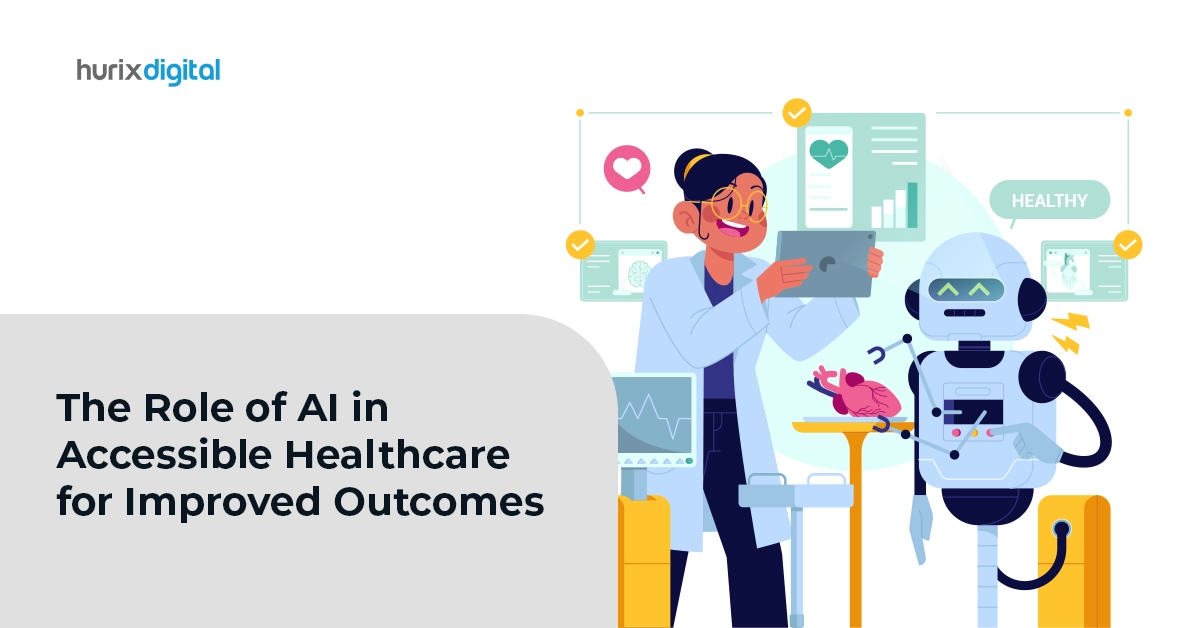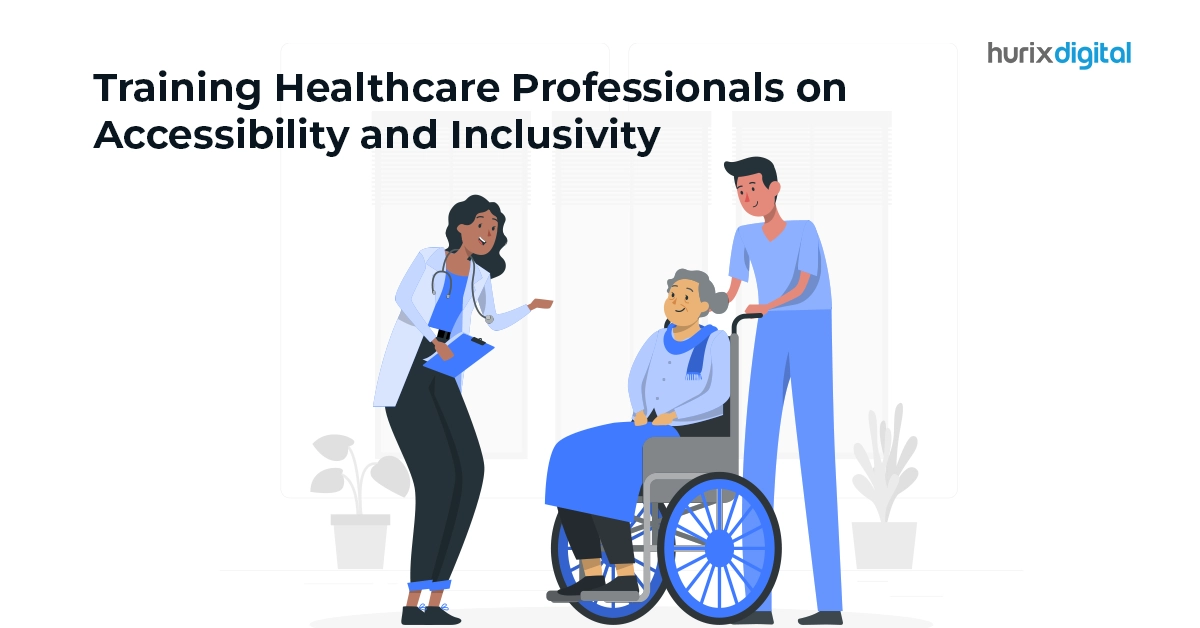
The Role of AI in Accessible Healthcare for Improved Outcomes
Artificial intelligence is now finding its place in all spheres of life. Healthcare has evolved into one such space where it has made significant progress. AI in healthcare accessibility has transformed how patients access healthcare and are now at ease. Several healthcare accessibility innovations have come into the picture, bringing about an ease of accessing healthcare at both public and private healthcare institutions.
Healthcare today is not heavily dependent on doctors, who are limited in number. Several smart AI-enabled technologies have now taken center stage as they help these doctors handle their patients well.
By 2030, the AI-driven healthcare industry will be worth $187.95 billion. The industry is growing at a CAGR of 37%. In this article, we will discuss enhancing healthcare accessibility with AI and how the entire shift is bringing about a significant change.
Table of Contents:
- Barriers Hampering Accessible Healthcare
- The Role of AI in Making Healthcare Accessible
- In Conclusion
Barriers Hampering Accessible Healthcare
Several factors impact accessibility in healthcare services. To understand the application of AI better, it is important to assess these barriers first.
1. Time and Resources
Time plays a pivotal role when it comes to accessing healthcare. Patients have to wait in long lines at clinics, pharmacies, and even at their insurers to access healthcare and related benefits. You need to put hours aside if you decide to get a health checkup done, let alone get a treatment done.
People don’t have that kind of time and energy and hence, they might end up escaping the entire process altogether.
2. High Costs
Accessing healthcare in a developed or developing country can burn a hole in your pocket. According to a study, around 33% of Americans tend to delay their medical treatments due to the high costs involved. The number has increased even further during the aftermath of the pandemic.
3. Lack of Knowledge
The terms used in and around healthcare are enough to confuse you and make you feel overwhelmed. Also, they do not have a lot of knowledge when it comes to different ways of accessing healthcare. The entire system is designed in such a way that it creates a lot of confusion and panic among the patients and their caregivers.
Several other things contribute to making the barrier even stronger. One other factor is the income disparity between high-income and low-income people. The healthcare system is designed in a way that is only accessible to people with money and resources. Several other factors like insurance, geography, etc. also contribute to building these barriers.
Also Read: How to Create a Better Training Strategy for Your Healthcare Organization?
The Role of AI in Making Healthcare Accessible
There are different ways in which AI has tried to cut through the barriers and make significant headway in making healthcare more accessible. With the help of different digital healthcare accessibility tools, AI is bringing about a major change in the way people access healthcare. Let’s have a look at a few improved outcomes.
1. Enhances Patient Experiences
Artificial intelligence has brought in a significant level of automation for patients. It plays a pivotal role in making healthcare accessible for different patients. With AI-driven healthcare accessibility solutions, patients can easily schedule check-ups and follow-ups without standing in long queues at the hospitals. Also, AI has enabled patients to access their health records instantly.
Several advanced tools are making use of speech recognition technology to schedule check-ups and payments without the involvement of a human. These systems are designed to effectively manage the heavy inflow of calls received by any healthcare facility.
2. Putting Data to Use
Millions of patients access healthcare and related facilities every day. While this has created a huge pool of data, this data is not being put to any use. This data can be easily used to save lives if you start analyzing them correctly.
With machine learning, medical professionals can segregate data and then analyze them to gather insights. Technologies like natural language processing help medical professionals classify clinical documents and other data and prepare reports, making active use of conversational AI.
These models are trained to replicate doctor-patient interactions, which helps the doctor better understand the case. These systems have empowered AI professionals to understand their patients better, positively impacting the time spent on one patient in hospitals and clinics. All of these technologies have significantly reduced the burden on nurses and helpers, who can now focus more on providing care to patients.
3. Bringing in Automation
The healthcare industry has remained unorganized for quite some time. However, with the active use of artificial intelligence in transforming the entire space, several processes have now become automated. Accessing healthcare records, timely payment of bills, and booking appointments are some of the important areas when it comes to healthcare accessibility.
With robotic process automation or RPAs, healthcare providers have become equipped to perform redundant tasks that require a lot of manual labor. It has also helped them streamline processes, making healthcare much more accessible. It helps them save time and effort and also enables them to empower their patients with better healthcare services and access to all kinds of information about their health and well-being.
4. Other Benefits
AI has improved the efficiency of healthcare providers and is now helping them in different aspects of managing patients and making healthcare accessible for all. Let’s have a look at some other improved outcomes that AI has brought about.
- With AI, administrative tasks like doing paperwork and recordkeeping get managed easily. Healthcare providers now have different models designed to take care of the administrative workflow, freeing up resources and putting them to use better.
- Virtual nursing assistants, another AI-backed feature, have received a lot of acceptance as they allow patients to get answers to questions about medicines and other remedies. People can access these assistants from the convenience of their homes. Hence, it makes healthcare accessible and significantly reduces the burden on the shoulders of healthcare providers.
- AI has enabled healthcare professionals to identify errors and fix them in real-time. This includes the correction of dosages for self-medications and other record-keeping issues. Healthcare education has become easier with AI.
Also Read: Unboxing Accessibility: Your Guide to Born-Accessible Design
In Conclusion
Artificial intelligence has transformed how healthcare operates. It has made healthcare automated and much more accessible to the people out there. Several AI-driven healthcare accessibility solutions are now in the picture, that contribute to improving healthcare user experience. These tools have also made healthcare diagnosis easier.
At Hurix Digital, we transform the world by helping companies deliver engaging digital content, which improves user engagement. To understand how to empower healthcare providers with an interactive learning experience, you can get in touch with us.
We have revolutionized education and have made implementation of technologies easier. We can help you understand the impact of AI and related technology in the healthcare space and how you can materialize on the same.
Get in touch with us now!

Vice President – Digital Content Transformation. He is PMP, CSM, and CPACC certified and has 20+ years of experience in Project Management, Delivery Management, and managing the Offshore Development Centre (ODC).








